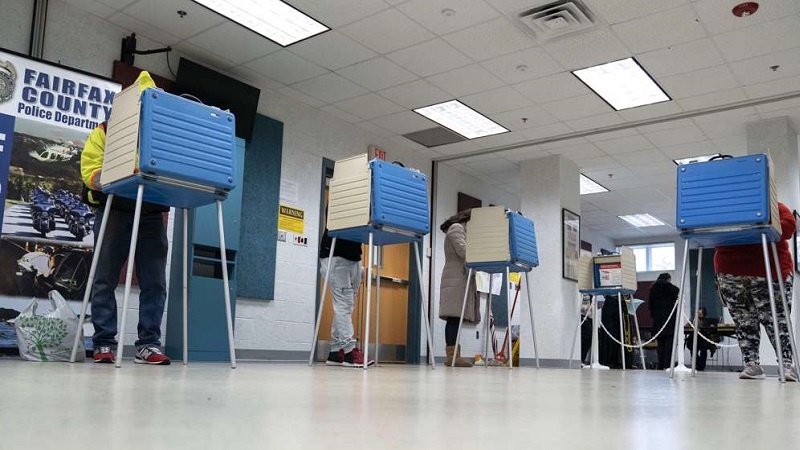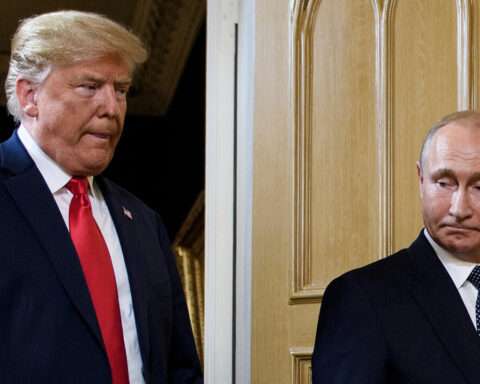“The Election should end on November 3rd., not weeks later!” he tweeted on Friday, two days after telling reporters in Nevada, “Hopefully, the few states remaining that want to take a lot of time after Nov. 3 to count ballots, that won’t be allowed by the various courts.”
“You would think you want to have the votes counted, tabulated, finished by the evening of Nov. 3,” he said at a campaign event a week earlier.
In reality, the scenario Mr. Trump is outlining — every vote in a modern election being “counted, tabulated, finished” by midnight — is not possible and never has been. No state ever reports final results on election night, and no state is legally expected to.
President Trump has been trying to pre-emptively delegitimize ballots counted after Nov. 3. But states have always counted past election night.
With just three days until Election Day, pre-election voting has now surpassed two-thirds of all ballots cast during the 2016 presidential election.
More than 91.6 million Americans have voted so far, as a majority of states are reporting record early voting turnout in the 2020 election. While it’s too soon to know how that record turnout will translate to Election Day, the massive early voting numbers suggest a high level of enthusiasm for voting this year, despite the obstacles of a pandemic.
These votes represent about 43% of registered voters nationwide, according to a survey of election officials in all 50 states and Washington, DC, by CNN, Edison Research, and Catalist.
Sixteen states have already seen more than half of their registered voters cast ballots ahead of November 3.
Nationwide, the more than 91.6 million ballots already cast represent about 67% of the more than 136.5 million ballots cast in the 2016 presidential election.
Pre-Election Day voting is surging nationwide — with many states seeing record turnout in early voting in-person and an influx in mail-in ballots compared to last cycle — with voters wanting to avoid crowding at the polls because of the pandemic.
As of Friday, Texas and Hawaii surpassed their total turnouts from the 2016 general election.
Thirty-five states and Washington, DC, have crossed their halfway marks for total 2016 ballots cast, including 13 of CNN’s 16 most competitively ranked states — Texas, Georgia, North Carolina, Nevada, Florida, Arizona, Colorado, Wisconsin, Maine, Iowa, Michigan, Minnesota and Nebraska.
How to spot a red or blue ‘mirage’ in early election night results
How to spot a red or blue ‘mirage’ in early election night results
About half of the votes already cast this cycle come from those 16 key states, which will play a crucial role in determining who wins the presidency this year.
Some voter information comes from Catalist, a company that provides data, analytics and other services to Democrats, academics and nonprofit issue-advocacy organizations, and is providing insights into who is voting before November.
The early voting numbers come amid an ongoing pandemic, leading many states to extend their early voting period or expand access to mail-in voting. Voters in some states have braved long lines and endured hours-long waits to cast their ballots in-person.
Supporters of Democratic nominee Joe Biden have shown a strong preference for mail-in voting, while most President Donald Trump’s supporters say they want to vote on Election Day.
Not all states report party affiliations of early voters, but in several states — including Florida, North Carolina, Nevada and Iowa — Republicans are beginning to narrow the Democratic advantage in pre-Election Day voting.
Trump and Biden’s schedules in the final stretch of this campaign have reflected the focus on those competitive states.
In the last weekend before Election Day, Trump was spending Saturday in Pennsylvania, while Biden was campaigning in Michigan with former President Barack Obama. Biden then heads to Philadelphia on Sunday, as the President has five rallies planned in five key states — Michigan, Iowa, North Carolina, Georgia and Florida.
Americans are accustomed to knowing who won on election night because news organizations project winners based on partial counts, not because the counting is actually completed that quickly. These race calls mean Candidate A is far enough ahead that, given the number of outstanding ballots and the regions those ballots are coming from, Candidate B would realistically be unable to close the gap.
The difference this year is not the timing of final results — those will come, as always, by the certification deadlines each state has set, ranging from two days after the election in Delaware to more than a month after in California. The difference, rather, is when news organizations are likely to have enough information to make accurate projections.
If, as Mr. Trump suggested, courts were to force states to stop counting after Nov. 3, it would be an extraordinary subversion of the electoral process and would disenfranchise millions of voters who cast valid, on-time ballots.
“Everyone — including Joe Biden, the Democrat Party, the mainstream media and the American public — should want election results they can trust and for every valid ballot to count,” said Thea McDonald, a spokeswoman for Mr. Trump’s campaign. “President Trump and Republicans have long fought for these key principles of our democracy, and in many states won, in the fight against Democrats’ attempts to effectively delay Election Day.”
Ms. McDonald pointed to efforts in some states to accept ballots that are received late if they were postmarked by Election Day — or, in some cases, if the postmark is not clear — and said this was “exactly the kind of late ballot counting President Trump has been fighting to prevent.”






